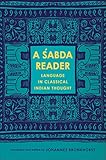A Śabda Reader : Language in Classical Indian Thought / ed. by Johannes Bronkhorst.
Material type: TextSeries: Historical Sourcebooks in Classical Indian ThoughtPublisher: New York, NY : Columbia University Press, [2019]Copyright date: ©2019Description: 1 online resourceContent type:
TextSeries: Historical Sourcebooks in Classical Indian ThoughtPublisher: New York, NY : Columbia University Press, [2019]Copyright date: ©2019Description: 1 online resourceContent type: - 9780231189408
- 9780231548311
- 409.34 23
- B132.S4 S228 2019
- online - DeGruyter
- Issued also in print.
| Item type | Current library | Call number | URL | Status | Notes | Barcode | |
|---|---|---|---|---|---|---|---|
 eBook
eBook
|
Biblioteca "Angelicum" Pont. Univ. S.Tommaso d'Aquino Nuvola online | online - DeGruyter (Browse shelf(Opens below)) | Online access | Not for loan (Accesso limitato) | Accesso per gli utenti autorizzati / Access for authorized users | (dgr)9780231548311 |
Frontmatter -- Contents -- Preface -- Part I: Introduction -- General Observations About Philosophy in India -- Chapter One. The Brahmanical Background -- Chapter Two. Buddhist Thought: Source Of Inspiration -- Chapter Three. The Grammarian Patanjali -- Chapter Four. The Special Place Of Sanskrit And The Veda -- Chapter Five. Self-Contradictory Sentences -- Chapter Six. Do Words Affect Cognition? -- Chapter Seven. Words And Sentences -- Chapter Eight. Other Denotative Functions Of The Word -- Part II: Reader -- Chapter One. The Brahmanical Background -- Chapter Two. Buddhist Thought: Source Of Inspiration -- Chapter Three. The Grammarian Patanjali -- Chapter Four. The Special Place Of Sanskrit And The Veda -- Chapter Five. Self-Contradictory Sentences -- Chapter Six. Do Words Affect Cognition? -- Chapter Seven. Words And Sentences -- Chapter Eight. Other Denotative Functions Of The Word -- Index of Passages Translated or Referred To -- The Texts and Their Dates -- Tentative and Approximate Chronological Table of Authors and Works -- Editions Used -- Technical Terms and Their Equivalents in English -- Abbreviations -- Notes -- References -- Index
restricted access online access with authorization star
http://purl.org/coar/access_right/c_16ec
Language (śabda) occupied a central yet often unacknowledged place in classical Indian philosophical thought. Foundational thinkers considered topics such as the nature of language, its relationship to reality, the nature and existence of linguistic units and their capacity to convey meaning, and the role of language in the interpretation of sacred writings. The first reader on language in-and the language of-classical Indian philosophy, A Śabda Reader offers a comprehensive and pedagogically valuable treatment of this topic and its importance to Indian philosophical thought.A Śabda Reader brings together newly translated passages by authors from a variety of traditions-Brahmin, Buddhist, Jaina-representing a number of schools of thought. It illuminates issues such as how Brahmanical thinkers understood the Veda and conceived of Sanskrit; how Buddhist thinkers came to assign importance to language's link to phenomenal reality; how Jains saw language as strictly material; the possibility of self-contradictory sentences; and how words affect thought. Throughout, the volume shows that linguistic presuppositions and implicit notions about language often play as significant a role as explicit ideas and formal theories. Including an introduction that places the texts and ideas in their historical and cultural context, A Śabda Reader sheds light on a crucial aspect of classical Indian thought and in so doing deepens our understanding of the philosophy of language.
Issued also in print.
Mode of access: Internet via World Wide Web.
In English.
Description based on online resource; title from PDF title page (publisher's Web site, viewed 02. Mrz 2022)


